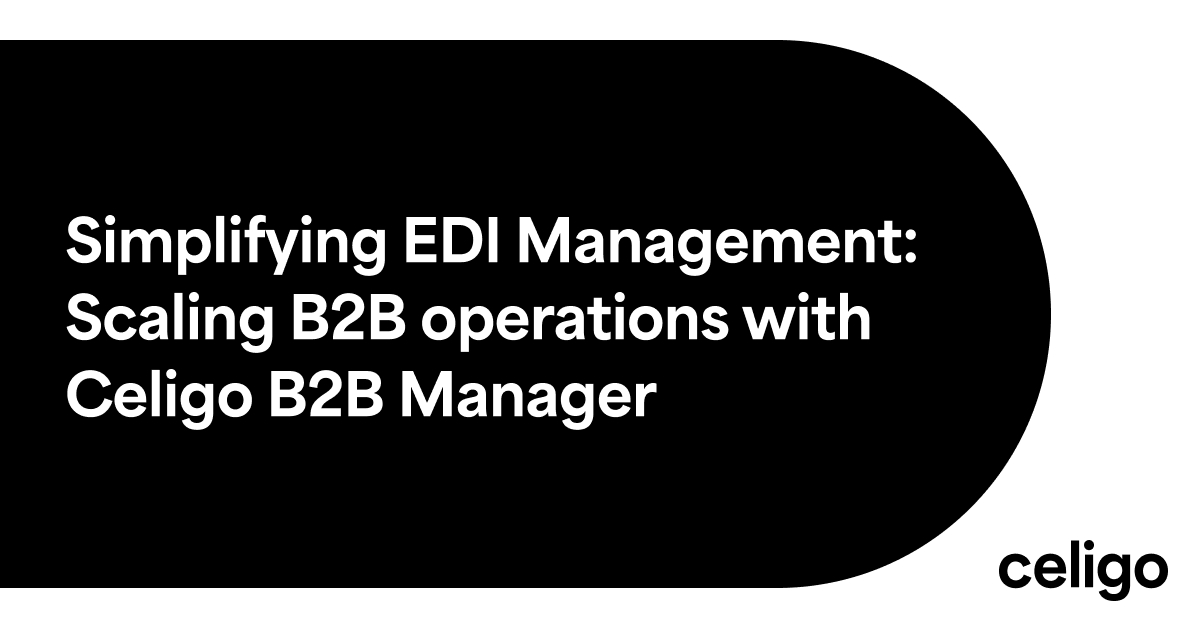Published Oct 28, 2024
Tackling EDI management challenges with Celigo B2B Manager

- Managing EDI can be complex and inefficient.
- Traditional EDI management methods are costly and offer limited visibility.
- Celigo B2B Manager enables you to take control over EDI with a simplified self-service approach.
Electronic data interchange (EDI) has long been the cornerstone of streamlining supply chains and automating B2B transactions. But while it delivers on its promise of efficiency, EDI management introduces new complexities that companies must address to truly reap its benefits.
One of the biggest challenges companies face is long implementation times, which delay time to revenue and can lead to costly penalties like chargebacks. Unfortunately, the difficulties don’t end after implementation. Ongoing EDI management costs can quickly grow unexpectedly. Companies often don’t anticipate the resources they need to make up for the inefficient day to day processes. On top of that, EDI transaction backlogs and non-compliance with trading partner requirements hurt customer relationships, introducing business risks.
There’s a better way to manage EDI. Celigo B2B Manager addresses EDI challenges head-on and empowers teams to self-manage B2B integrations. Get a first-hand look at this new solution in our on-demand webinar, “Simplifying EDI Management: Scaling B2B operations with Celigo B2B manager.”
Here’s a sneak peek of what you’ll learn:
Comparing EDI solutions
Managing EDI has traditionally meant one of two options: self-managed EDI or fully managed EDI services. Self-managed EDI requires businesses to integrate directly with every trading partner and manage each integration in-house. Conversely, fully managed EDI services involve outsourcing EDI management to a third-party provider who handles all integrations.
Recently, modern EDI providers have emerged. These stand alone solutions often have established connections with trading partners to increase time to value.
However, each of these solutions has limitations that can be a barrier to your growth. Explore the common issues faced when implementing these solutions.
- Self-managed EDI through traditional iPaaS: Self-managing EDI through a traditional iPaaS (Integration Platform as a Service) requires significant developer resources to build, manage, and monitor each integration, which results in long implementation times, bottlenecks, and reduced agility. This approach can also be costly, as you either need to maintain an in-house development team or rely on expensive third-party providers.
- Modern EDI: While modern EDI solutions offer established integrations with trading partners, they fall short when it comes to connecting with your internal systems like enterprise resource planning (ERP) or customer relationship management (CRM) platforms. To achieve this kind of extensibility, modern EDI solutions must leverage an iPaaS. As a result, they lack the capabilities to be a comprehensive solution for B2B businesses.
- Fully managed EDI: Fully managed EDI can take the strain off of your internal resources, but this solution comes with trade-offs. You lose visibility and control over your EDI processes, and transaction-based pricing models can become expensive. Additionally, relying on external teams for implementation can lead to long delays and reduced agility.
Meet Celigo B2B Manager
To overcome these challenges, you need a different solution. That’s where Celigo B2B Manager comes in.
Celigo’s B2B Manager reduces the complexity of self-service EDI. Customers can centrally manage B2B and enterprise-wide integrations through a single platform. This reduces implementation times and total cost of ownership, ensures trading partner compliance and processing requirements are met, and increases visibility and control. Additionally, customers are empowered to self-service build, manage, and monitor their integrations, eliminating dependence on extensive IT resources or expensive white glove services.
By adopting Celigo B2B Manager, you can see a range of advantages. Here are a few notable benefits:
Faster time-to-trade
Features like prebuilt trading partner connectors, centralized EDI profiles with built-in rules for validation, and prebuilt EDI-ERP templates cover the most common EDI use cases out-of-the-box. These features significantly reduce setup time and complexity, allowing your business to streamline operations and boost efficiency.
See how you can install a prebuilt integration template for B2B flows.
Greater visibility and control
Celigo enables your team to streamline B2B management with end-to-end automation on a single platform, while giving you full visibility into transactions through a centralized dashboard. This solution empowers you to identify errors, ensure compliance through validation, and self-service, manage, troubleshoot, and customize integrations.
Take a closer look at Celigo’s EDI dashboard.
Lower costs
Unlike fully managed EDI solutions, which often rely on transaction-based pricing models, B2B Manager provides a transparent pricing model based on the number of trading partners and document types. This allows you to predict and control costs more easily. Additionally, through efficiencies introduced into the EDI implementation and management processes, B2B Manager helps you cut down on extensive labor costs.
Scale resources
Through the efficiencies introduced into self-service building, managing, and monitoring end-to-end EDI integrations, B2B Manager allows you to scale your operations with less IT and EDI resources.
Learn how you can set up a trading partner connector with Celigo.
Revolutionize EDI management
While EDI is crucial for automating B2B transactions, traditional EDI management methods fall short. These solutions slow down operations, extend onboarding times, and increase overall costs, making it difficult to fully optimize your supply chain.
Celigo B2B Manager reduces the complexity of self-service EDI management and enables businesses to take back control. To see how Celigo can transform your EDI strategy, watch “Simplifying EDI Management: Scaling B2B Operations with Celigo B2B Manager.”




